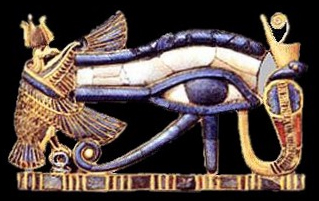Udjat
(Difference between revisions)
|
Revision as of 20:44, 12 Dec 2004 Cymen (Talk | contribs) |
Current revision Hierophag(e) (Talk | contribs) |
||
| Line 1: | Line 1: | ||
| - | The udjat is a famous Ancient Egyptian symbol of a human eye and eyebrow, with extra markings to make it resemble a falcon's eye. It is also known as the Eye of [[Horus|Heru]] (Horus), wadjet, utchat, or sometimes the [[Eye of Ra]]. | + | [[Image:Udjat.jpg|right|frame|The Eye of Horus from Tutankhamen's Tomb, 18th Dynasty]]The '''udjat''' is a famous Ancient Egyptian symbol of a human eye and eyebrow, with extra markings to make it resemble a falcon's eye. It is also known as the Eye of [[Horus|Heru]] (Horus), wadjet, utchat, or sometimes the [[Eye of Ra]]. |
| - | According to Egyptian mythology, during the contendings of [[Horus|Heru]] and [[Seth|Suti]] (Set/Seth) for [[Osiris]]' throne, [[Seth|Suti]] ripped out one [[Horus|Heru]]'s eyes. The damage was later healed, depending on the myth, either by [[Hathor|Het-Hert]] (Hathor) by milking a gazelle and putting the milk into the empty socket, or by [[Thoth|Tehuti]] (Thoth) through his magic. Some myths state that [[Horus|Heru]] then gave the Eye to [[Osiris]] so that he may rule the underworld. | + | According to Egyptian mythology, during the contendings of Heru and [[Set|Suti]] (Set/Seth) for [[Osiris]]' throne, [[Set|Suti]] ripped out one Heru's eyes. The damage was later healed, depending on the myth, either by [[Hathor|Het-Hert]] (Hathor) by milking a gazelle and putting the milk into the empty socket, or by [[Thoth|Tehuti]] (Thoth) through his magic. Some myths state that Heru then gave the Eye to [[Osiris]] so that he may rule the underworld. |
| - | The healing of [[Horus|Heru]]'s eye gave rise to the symbol being used as a healing and protective amulet. It was believed that placing it over an injury would magically heal it. | + | The healing of Heru's eye gave rise to the symbol being used as a healing and protective amulet. It was believed that placing it over an injury would magically heal it. |
| - | From the same myth, some Egyptians also believed that [[Seth|Suti]] tore the Eye up into sixty-four pieces. Fractions were assigned to each part of the Eye torn by [[Seth|Suti]], which only added up to 63/64. [[Thoth|Tehuti]] restored the eye, compensating for the missing part with his magic, and established it as a symbol of the restoration of natural order. | + | From the same myth, some Egyptians also believed that [[Set|Suti]] tore the Eye up into sixty-four pieces. Fractions were assigned to each part of the Eye torn by [[Set|Suti]], which only added up to 63/64. Tehuti restored the eye, compensating for the missing part with his magic, and established it as a symbol of the restoration of natural order. |
| - | [[Horus|Heru]]'s right and left eye represent the sun and moon, respectively. Thus, when the udjat is shown as a left eye it is linked with [[Thoth|Tehuti]], and with [[Ra]] when as a right eye. Together, the two eyes represent the entire universe. There have been suggestions that the two eyes are of a dualist nature, acting much like the [[yin-yang]] symbol of [[Taoism]]; the right eye representing masculine energies, and the left representing female energies. | + | Heru's right and left eye represent the sun and moon, respectively. Thus, when the udjat is shown as a left eye it is linked with Tehuti, and with [[Ra]] when as a right eye. Together, the two eyes represent the entire universe. There have been suggestions that the two eyes are of a dualist nature, acting much like the [[yin-yang]] symbol of [[Taoism]]; the right eye representing masculine energies, and the left representing female energies. |
| + | |||
| + | [[Category:Egyptian Culture]] | ||
Current revision
The udjat is a famous Ancient Egyptian symbol of a human eye and eyebrow, with extra markings to make it resemble a falcon's eye. It is also known as the Eye of Heru (Horus), wadjet, utchat, or sometimes the Eye of Ra.According to Egyptian mythology, during the contendings of Heru and Suti (Set/Seth) for Osiris' throne, Suti ripped out one Heru's eyes. The damage was later healed, depending on the myth, either by Het-Hert (Hathor) by milking a gazelle and putting the milk into the empty socket, or by Tehuti (Thoth) through his magic. Some myths state that Heru then gave the Eye to Osiris so that he may rule the underworld.
The healing of Heru's eye gave rise to the symbol being used as a healing and protective amulet. It was believed that placing it over an injury would magically heal it.
From the same myth, some Egyptians also believed that Suti tore the Eye up into sixty-four pieces. Fractions were assigned to each part of the Eye torn by Suti, which only added up to 63/64. Tehuti restored the eye, compensating for the missing part with his magic, and established it as a symbol of the restoration of natural order.
Heru's right and left eye represent the sun and moon, respectively. Thus, when the udjat is shown as a left eye it is linked with Tehuti, and with Ra when as a right eye. Together, the two eyes represent the entire universe. There have been suggestions that the two eyes are of a dualist nature, acting much like the yin-yang symbol of Taoism; the right eye representing masculine energies, and the left representing female energies.
![[Main Page]](http://www.thelemapedia.org/images/logo.gif)
